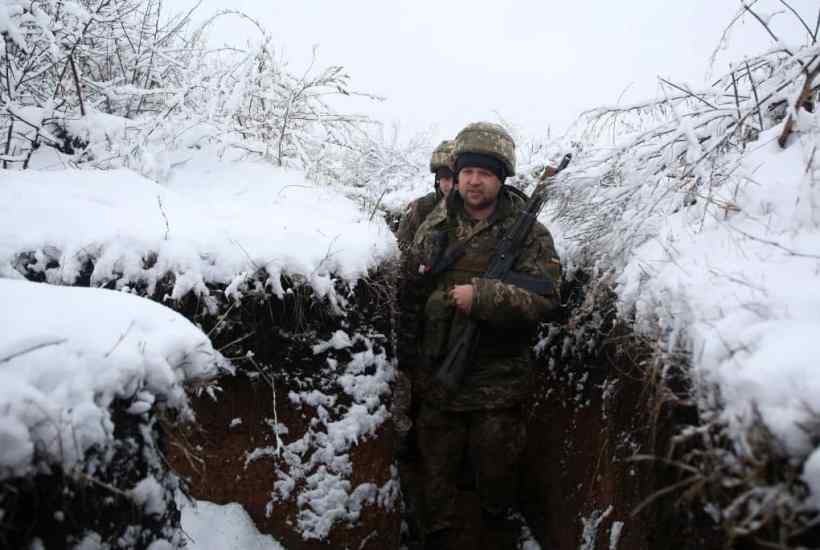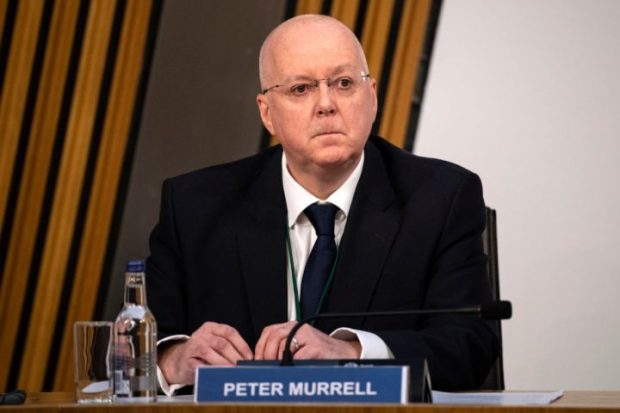Western warnings of an ‘imminent’ Russian invasion of Ukraine have grown more insistent in recent weeks with different voices, from the media to politicians, needlessly stoking the fires of war with their aggressive and inaccurate rhetoric.
Part of the reason for this is because the grainy satellite images of Russian troops poised on Ukraine’s border, just waiting for their orders to attack, conformed so well to every western stereotype: an aggressive Russia under a dictatorial leader, ready to bully, if not annihilate, poor little – well, actually not so little – Ukraine and snuff out its entirely legitimate aspirations to join the western world. You did not need to know anything about Russia or even to have a very good idea of where Ukraine is, let alone its history, or what it looks and feels like, to speak pretty confidently about Russia’s malign intentions.
If the media were amplifiers, those talking up the danger, at the start at least, have chiefly been US and UK politicians. President Biden might have seemed at times unclear about whether an invasion really was a prospect – and if it was, whether it would really be that big a deal – but his Secretary of State, Anthony Blinken, was in no doubt, and did his best to keep him on the straight and narrow.
In the UK, the Foreign Secretary, Liz Truss, wildly inflated both the number of Russian troops on the border – ‘hundreds of thousands’ she told the BBC Today programme, when the very highest estimate at the time was 125,000. She also gave the impression, deliberately or not, that Russia had already tried to replace the elected government in Kyiv and mounted ‘false flag’ attempts to tempt Ukraine into war – when US intelligence reports at the time suggested such heinous deeds were only a prospect. Interestingly, the ‘false flag’ plot claim was reheated and reoffered to the media ten days later to greater effect.
Tom Tugendhat (chair of the Commons Foreign Affairs Committee) was also equally certain of Russia’s intentions. Tugendhat told Sky News, that ‘invading Ukraine is something he [the Russian President, Vladimir Putin] has been wanting to do for some time.’ As someone who follows Putin quite closely, I have seen no evidence to support this whatever. Nor, while I am on the subject, have I seen any evidence for Putin’s supposed, and oft-repeated, refusal to accept today’s Ukraine as an independent state. On the contrary, I have actually heard him, live and in person, say that he does. (But then, of course, the riposte comes back: whoever would believe Vladimir Putin?)
From specialist think-tankers and, yes, journalists, came other questionable versions of the truth. There was a claim that Russia had not only invaded the Donbas region of eastern Ukraine in 2014, but ‘taken’ it – which it certainly has not done, because there has been a simmering, and unresolved, war there for the past eight years.
Such common factual errors have been used during the Ukraine crisis to support the idea of a scurrilous Russian ‘pattern of behaviour’ into which Russia’s 2014 annexation of Crimea – and a 2022 invasion of Ukraine, of course – neatly fit. A favourite has been the assertion that Russia started the 2008 Georgia war by invading. In fact, Russia’s invasion was in response to a Georgian attack on one of Russia’s protectorates inside Georgia’s borders – as an EU report later that year found.
Another reason this false sequence has resurfaced now is the seductive parallel that can be drawn. The Georgia war began on the eve of the Beijing Olympics, and Putin, then Russian Prime Minister, was in China – as he is now for the Winter Olympics. Russia, so the fabrication goes, contrived to trigger the 2008 war under cover of the Beijing games and could do something similar again – even though the truth is that, if anyone was using the 2008 Olympics as a diversion, it was Georgia’s hothead President (and western protege), Mikheil Saakashvili.
But it is not just facts that have been flouted in this western view of Russia’s intentions towards Ukraine. Some of Putin’s more famous utterances have been grievously misconstrued.
One that has played a starring role in this western-Russia stand-off so far is a collection of quotations from an essay that appeared under Putin’s name on the Kremlin website back in July, discussing the history of Russian-Ukrainian relations. This has been a staple of the West’s misreading of Russian intentions, to the point where it was dignified with a riposte from the UK Defence Secretary, Ben Wallace, last month.
The single point commonly taken from Putin’s essay is his assertion that Russians are Ukrainians are ‘one people’ – a better translation might be ‘kin’. Yet however you translate it, there is nothing in his essay that would imply Russia’s right to a landgrab for Ukraine. Indeed, towards the end, Putin says that sometimes ‘a part of a people decide to take another course’, and that decision, he says, needs to be treated with ‘respect’. This paragraph, though, is either ignored or dismissed (as it was by Wallace). This western ‘set text’ should have been corrected months ago. Still, it remains chapter and verse.
Perhaps the most commonly cited and misconstrued Putin quotation is his description of the collapse of the Soviet Union as being ‘the greatest catastrophe of the 20th century’. There can be quibbles about the precise translation, but however it is translated, it does not mean – as it is invariably interpreted – that Putin wants to recreate the Soviet Union and/or the Russian Empire. He is on the record as saying that he was referring to the domestic dislocation that resulted, not Russia’s loss of territory or power.
But that has done nothing to dislodge the original misreading, even though there is another Putin quotation, equally pithy, that might better sum up his view. ‘He who does not regret the passing of USSR has no heart; he who wants to restore it has no head.’ The common western idea that Putin sees his mission as resurrecting the Soviet Union is simply wrong.
Another Putin saying, directly relevant to the Ukraine situation, has suffered a similar fate. ‘I can take Kyiv in two weeks if I want to’, Putin is quoted as saying after Russia annexed Crimea in 2014. What he actually said would be better translated as ‘I could take Kyiv in two weeks if I wanted to’, meaning ‘I could, but I don’t want to’. In other words, it is a disavowal, not a confirmation, of an intention to take Kyiv.
Time and again, Putin’s words have been twisted or misconstrued – sometimes, it seems, because confirmation bias skews the translation – in a way that fits and reinforces western preconceptions. And the Ukraine crisis has offered one of the most glaring examples of how most of the western media has been content to pick up and run with the errors, apparently unaware or unconcerned about the distorted picture that results.
It is not only the media that is at fault here, of course. Politicians and others habitually blame journalists for their woes, but they don’t by and large invent stuff. They may though pander to what they anticipate their readers want and expect, and partly because of this they can all too easily be ‘spun’. The Iraq ‘dodgy dossier’ was an extreme example.
A bigger fault, though, is a reluctance to challenge what we are fed by officials and pressure groups, especially when it chimes with widely shared preconceptions. This is a particular problem, it seems to me, when a story, such as the Ukraine crisis, escapes from specialists and reporters on the ground and becomes a major international news story, with the Westminster lobby or the White House press corps particular weak points. (Why do you think, I just offer as an aside, didn’t we learn of No. 10 parties from any lobby correspondents the mornings after?)
The Ukraine crisis has allowed the US and UK governments to use a compliant and often poorly informed media to magnify the Russia scare, foster Nato solidarity and present themselves as noble protectors of Ukraine. Far from fending off a war, this hype recklessly brought the prospect of war closer – thankfully, not yet to the point of no return.
Got something to add? Join the discussion and comment below.
Get 10 issues for just $10
Subscribe to The Spectator Australia today for the next 10 magazine issues, plus full online access, for just $10.



















Comments
Don't miss out
Join the conversation with other Spectator Australia readers. Subscribe to leave a comment.
SUBSCRIBEAlready a subscriber? Log in